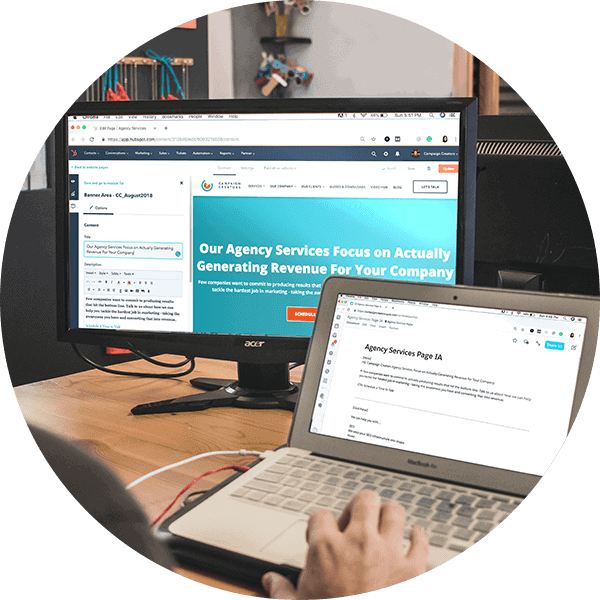
Inbound Vs. Outbound Marketing — Which Marketing Style Wins?
February 2, 2024
Data Literacy: Turning Data into Valuable Information
March 7, 2024Have you ever received any emails with enticing subject lines like “We have some insights to improve your website”?, or “Your website isn’t performing as it should”, or “25% discount on our services”? Tempted, you end up clicking and sharing your information with the sender, and… they got you.
You probably think to yourself, “This will never happen to me”. And yet, despite the growing awareness of phishing and internet scams, you will be surprised by how many people fall for this trap. According to the Federal Trade Commission’s data, U.S. adults lost a record $10 billion to fraudsters in 2023, with this number increasing YoY. So, yes, this can happen to anyone.
Unaware of Your Marketing Analytics? They Will Use It Against You
Every business desires success, and it’s widely acknowledged across industries that data analytics forms the cornerstone of a successful marketing strategy. However, many companies lack a full understanding of their data or, worse yet, fail to monitor it properly, trying to avoid facing challenges with data analytics.
This knowledge gap and self-doubt leave opportunities for fraudsters and other greedy marketing agencies to take advantage of businesses. They position themselves as data experts with insights and solutions that can lead to better performance. But rather than help overcome struggles with marketing analytics, they exploit uncertainties and vulnerabilities to access valuable information and make you pay extra for unnecessary services. Their offers to improve problems are a cover so they can extract data for their own profit rather than genuinely assist business growth and success.
When Spam Becomes Scam — Common Phishing Methods to Look Out For
1. Cold Emails about Poor Marketing Performance
This is the most widespread deceptive tactic but also the trickiest one. Cold outreach is (still) a common marketing practice, and most cold emails that flood your inbox are probably legit. However, when the email sounds “too promising” or “too generous,” this is probably a red flag. One example is cold emails that claim your site isn’t performing well and offer SEO services and “insights into boosting your website traffic.” These emails provide persuasive but fake data (if any data at all), displaying nonexistent issues and offering their solutions as a so-called remedy. Once retaining access, they start milking you, extracting data and money, and potentially selling your information to untrustworthy third parties.

2. LinkedIn Messages
Being the most business-oriented social network, it is not uncommon for scammers to try to deceive business professionals within the platform. Scammers pose as industry experts and offer free consultations, data insights, or profile feedback. After developing a connection, they claim credentials, require verification, or share profiles needing “confirmation.” Clicking any links sent by those new LinkedIn contacts could put you at risk.
3. Free Websites/Data Audits Offers
Sometimes, you might come across Google ads or receive emails offering free website or data audits to uncover marketing performance issues. Indeed, while these audits are genuinely crucial for optimizing marketing performance, the problem lies in the system. In reality, these “free tools” could contain malware, which could extract valuable customer data or install viruses. The only thing you may get out of it is losing control over valuable information while risking your clients’ data as well. To make it more tangible, Cheq discovered that in 2022, the total cost of ad fraud reached around $61 billion. Please don’t become a part of this statistic.
How to Avoid Being Defrauded? — Know Your Marketing Analytics
From learning about these scams, a clear trend emerges: Spammers and scammers are lurking behind the screens, trying to manipulate business professionals with made-up numbers about their marketing analytics. We don’t want you to give them the pleasure of tricking you.
So what can you do about it?
1. Acknowledge the reality. Resist the notion that you are immune.
The numbers indicate that virtually everyone is susceptible to these marketing scams.
2. You must remember that outside parties do not have access to your marketing analytics!
Any unsolicited claims or insights about your data from unauthorized sources should be met with skepticism, as these are likely attempts to deceive.
3. If you are working with a marketing agency, request access to your data.
Sometimes, cold emails that land in your inbox may say something like, “We scanned your site using our proprietary software and found…”. Although “proprietary software” sounds pretty exclusive, it almost always means that the software (if it exists) is designed to yield results favorable to the owning company.
Having access to the data allows you to compare such findings with data from reliable platforms like Google Analytics. A transparent and responsible marketing agency should readily share this data without you needing to ask, demonstrating a commitment to accountability and fostering a trusting client-agency relationship.
4. Most importantly, the best defense against data scams comes through data literacy.
When you can read your marketing reports and understand the basic marketing metrics and their significance, you are empowered to think critically about your data. You can use your best judgment to discern between authentic insights and malicious schemes. You will be able to evaluate the “good advice” and distinguish between vanity metrics, bad data, and high-quality data.
Knowledge of Marketing Analytics Is Your Weapon Against Data Scams
Amid this intricate landscape, businesses must stay vigilant against spammers and dubious marketing agencies aiming to exploit your unfamiliarity with your data. But with a proactive approach and courage to delve into your analytics, you can protect yourselves from such pitfalls. Similar to steering your business toward success, the ability to avoid falling into such traps is firmly in your hands.
Access to your data is more than just “nice to have.” It is your right. Knowing your data not only protects you from potential scams, but also fuels well-informed and strategic marketing strategies for future growth.
At Waypost Marketing, we promote data literacy by granting you access to your marketing analytics and educating you about its significance. Unlock the power of your marketing data by contacting us today.








